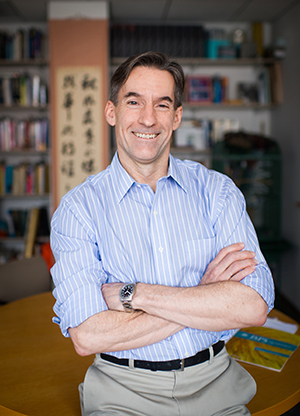For John Straub, Teaching Is about Sharing Enthusiasm
2016 United Methodist Church Scholar/Teacher of the Year

John E. Straub never planned to be a teacher. “I have known natural, gifted teachers,” he says. “I am not one.” A born introvert, Straub has learned that much of what makes a good teacher is enthusiasm for one’s subject, and that’s something he has in abundance. The College of Arts & Sciences professor of chemistry and appointed professor in the College of Engineering’s Division of Materials Science & Engineering has been on the BU faculty for 25 years. He has been named the 2016 United Methodist Church Scholar/Teacher of the Year, given to outstanding scholars who are dedicated and gifted educators.
The award follows a 2005 Metcalf Award for Excellence in Teaching, one of the University’s highest teaching accolades, and the Gitner Award for Distinguished Teaching in 2003.
Straub says he cultivated a sense of wonder and love for science and math as a child poking around the natural world, trying to make sense of things. Through his long, distinguished career he has never lost that passionate curiosity, and after combating his initial terror of public speaking, he grew to love teaching and has proven to be a classroom innovator. “John Straub is a remarkable colleague,” says Lawrence Ziegler, a CAS professor and chair of chemistry. “His impact in chemistry raises the quality of the department’s productivity in all phases of our core missions: research, teaching, and outreach/service, and his input on important University initiatives is highly sought and valued.”
Straub will be presented with the United Methodist Church Scholar/Teacher of the Year Award at the annual celebration for teaching, research and scholarship this evening. The award, established by the General Board of Higher Education and Ministry of the United Methodist Church and conferred at colleges and universities historically affiliated with the United Methodist Church, recognizes outstanding scholars for their dedication and contributions to the learning arts and to the institution.
An Alfred P. Sloan Research Fellow from 1995 to 1997, Straub “explores protein dynamics and thermodynamics using theoretical and computational methods, with a particular focus on elucidating pathways for conformational change associated with protein energy transfer, signaling, folding, and aggregation,” his website says. If that makes little or no sense to lay readers, it is also a reflection of Straub’s gifts as a translator of arcane subject material to students of varying STEM (science, technology, engineering, and math) backgrounds.
“My scholarship is in the field of theoretical and computational chemistry and biophysics,” Straub says. “Using the principles of physics as applied to atoms and molecules, we develop detailed, atomic level simulations of the molecular world that allow us to address fundamental questions related to the properties of complex matter (including novel materials) and biological systems (related to human health). Based on our observations, we have formed novel hypotheses related to the nature of energy flow in molecular machines, factors controlling the rates of chemical reactions, the fundamental mechanisms controlling molecular self-assembly, and the etiology of Alzheimer’s disease.” He describes his research, which draws on collaboration with scientists around the world, as curiosity-driven. His lab’s explorations have been wide-ranging and the findings have been published in journals of chemistry, physics, computational science, and applied mathematics.
“When I was a young person, I had this enormous enthusiasm for science and loved mathematics,” he says. “But situations like having to stand up in front of a class and deliver a book report, or be in a play, absolutely terrified me. I never thought I’d be in a position where I’d be presenting ideas in front of large groups of people.”
Straub says the life of a researcher was a good fit for him, “but I didn’t ever think of myself as a teacher, even through graduate school and as a postdoc, and then when I was hired as a professor as well as a research scientist, I had to think a lot about teaching and work very hard at it,” he says. “I feel teaching is very personal thing. Success as a teacher involves personality; you can’t just copy someone else’s style.”
He was motivated (and heartened), he says, in large part by an essay by Noam Chomsky about teaching that said 80 percent of good teaching is sharing your enthusiasm with your students. “What you can do beyond that is come to know your students and what inspires them,” says Straub.
An important feature of his teaching style is his innovative grading system, influenced by a mentor he worked with while a postdoc at Harvard. “I want the students to be judged by their best work,” Straub says. “As such, I use a grading system that counts only the student’s best performance, on an hour exam or the corresponding section of the comprehensive final, as their topical assessment. This allows students entering the course with a strong background to demonstrate mastery at the outset, and students that struggle at first but meet a high standard in the end to be graded without penalty for a slow start. In these many ways, my teaching is informed and enriched by the culture of scientific scholarship.”
Straub says he wants his students to feel his enthusiasm for scientific exploration of the natural world, to “find beauty and inspiration in the expression of truly great ideas, to enjoy the rewards that come from solving hard problems.” This, he adds “is what being a scholar-teacher means to me.
“It’s a pleasure to be a teacher.”
Comments & Discussion
Boston University moderates comments to facilitate an informed, substantive, civil conversation. Abusive, profane, self-promotional, misleading, incoherent or off-topic comments will be rejected. Moderators are staffed during regular business hours (EST) and can only accept comments written in English. Statistics or facts must include a citation or a link to the citation.